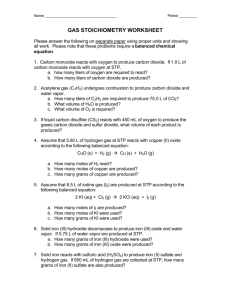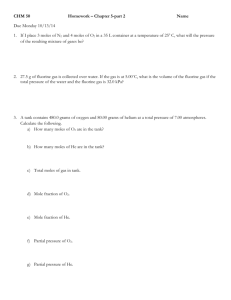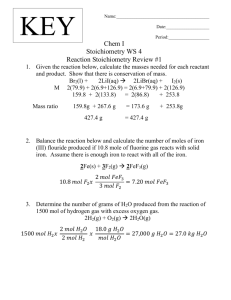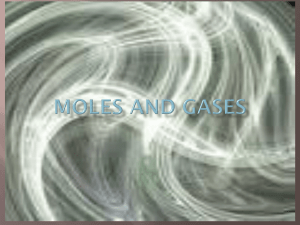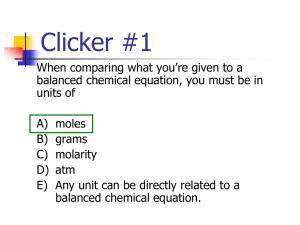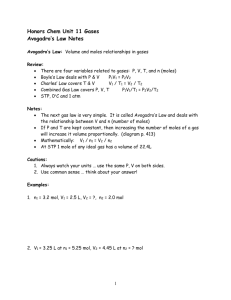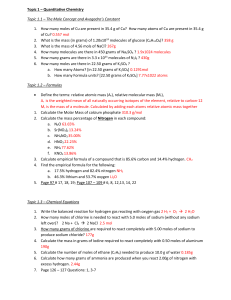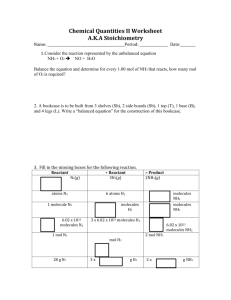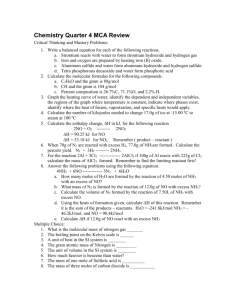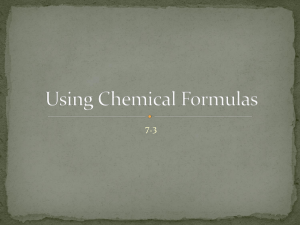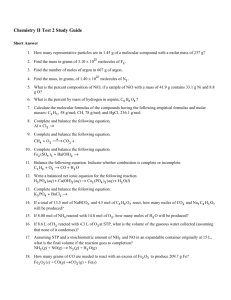Gas Stoichiometry Worksheet: Chemistry Problems
advertisement
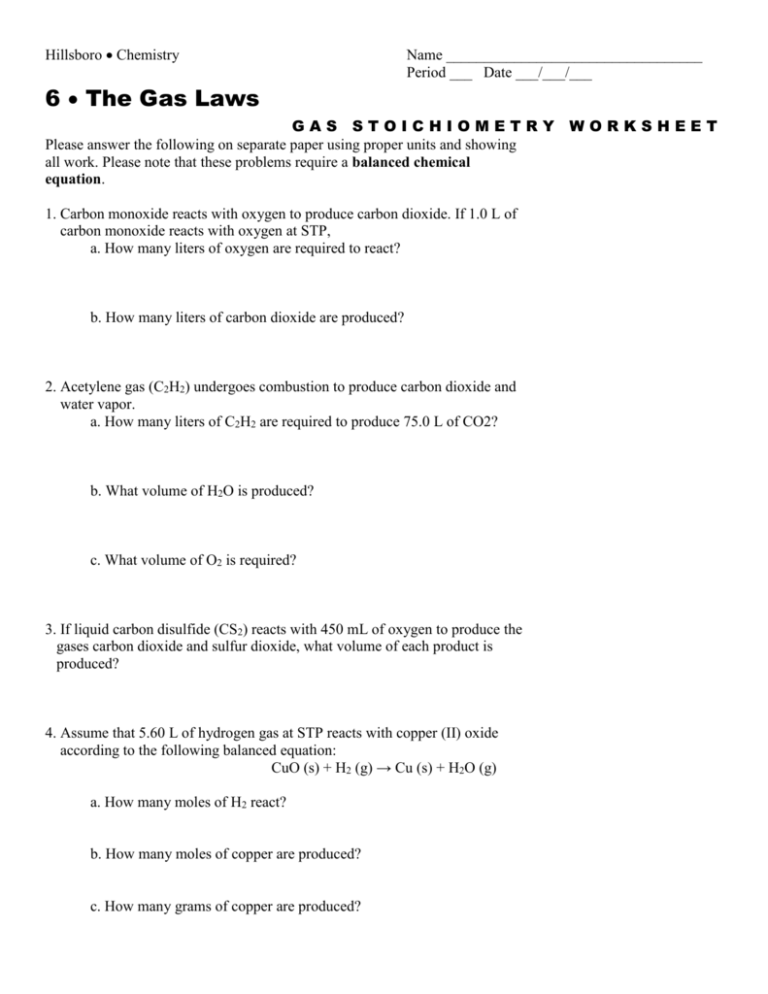
Hillsboro Chemistry Name __________________________________ Period ___ Date ___/___/___ 6 The Gas Laws GAS STOICHIOMETRY WORKSHEET Please answer the following on separate paper using proper units and showing all work. Please note that these problems require a balanced chemical equation. 1. Carbon monoxide reacts with oxygen to produce carbon dioxide. If 1.0 L of carbon monoxide reacts with oxygen at STP, a. How many liters of oxygen are required to react? 0.5 L O2 b. How many liters of carbon dioxide are produced? 1.0 L CO2 2. Acetylene gas (C2H2) undergoes combustion to produce carbon dioxide and water vapor. a. How many liters of C2H2 are required to produce 75.0 L of CO2? 37.5 L C2H2 b. What volume of H2O is produced? 37.5 L H2O c. What volume of O2 is required? 93.75 L O2 3. If liquid carbon disulfide (CS2) reacts with 450 mL of oxygen to produce the gases carbon dioxide and sulfur dioxide, what volume of each product is produced? CO2= 150 mL SO2= 300 mL 4. Assume that 5.60 L of hydrogen gas at STP reacts with copper (II) oxide according to the following balanced equation: CuO (s) + H2 (g) → Cu (s) + H2O (g) a. How many moles of H2 react? 0.25 mol H2 b. How many moles of copper are produced? 0.25 mol Cu c. How many grams of copper are produced? 15.88 g Cu 5. Assume that 8.5 L of iodine gas (I2) are produced at STP according to the following balanced equation: 2 KI (aq) + Cl2 (g) → 2 KCl (aq) + I2 (g) a. How many moles of I2 are produced? 0.38 mol I2 b. How many moles of KI were used? 0.76 mol KI c. How many grams of KI were used? 126.2 g KI 6. Solid iron (III) hydroxide decomposes to produce iron (III) oxide and water vapor. If 0.75 L of water vapor are produced at STP, a. How many grams of iron (III) hydroxide were used? 2.35 g Fe(OH)3 b. How many grams of iron (III) oxide were produced? 1.76 g Fe2O3 7. Solid iron reacts with sulfuric acid (H2SO4) to produce iron (II) sulfate and hydrogen gas. If 650 mL of hydrogen gas are collected at STP, how many grams of iron (II) sulfate are also produced? 4.40 g FeSO4 8. Assume that 13.5 grams of solid aluminum react with HCl according to the following balanced equation at STP: 2 Al (s) + 6 HCl (aq) → 2 AlCl3 (aq) + 3 H2 (g) a. How many moles of Al react? 0.5 mol Al b. How many moles of H2 are produced? 0.75 mol H2 c. How many liters of H2 are produced? 16.8 L H2 9. If air is 20.9% oxygen by volume, a. How many liters of air are needed to complete the combustion of 25.0 L of octane vapor (C8H18) at STP? 312.5 L O2 b. What volume of each product is produced? CO2= 200 L H2O= 225 L The following problems deal with reactions that do not occur at STP: 10. Ammonium sulfate, an important fertilizer, can be prepared by the reaction of ammonia with sulfuric acid according to the following balanced equation: 2 NH3 (g) + H2SO4 → (NH4)2SO4 (aq) Calculate the volume of NH3 (in liters) needed at 20ºC and 25.0 atm to react with 150 kg of H2SO4. 2945 L NH3 11. If 45.0 L of natural gas, which is essentially methane (CH4), undergoes complete combustion at 730 mm Hg and 20ºC, how many grams of each product are formed? CO2= 79.2 g H2O= 64.8 g 12. Fritz Haber, a German chemist, discovered a way to synthesize ammonia gas (NH3) by combining hydrogen and nitrogen gases at extremely high temperatures and pressures. a. Write the balanced equation for this reaction. 3 H2 + N2 → 2 NH3 b. If 10 kg of nitrogen combines with excess hydrogen at 550ºC and 250 atm, what volume of ammonia gas is produced? 193 L NH3 13. A 3.25 gram sample of solid calcium carbide (CaC2) reacts with water to produce acetylene gas (C2H2) and aqueous calcium hydroxide. If the acetylene was collected over water at 17ºC and 740.0 mm Hg, how many milliliters of acetylene were produced? 1250 mL C2H2
